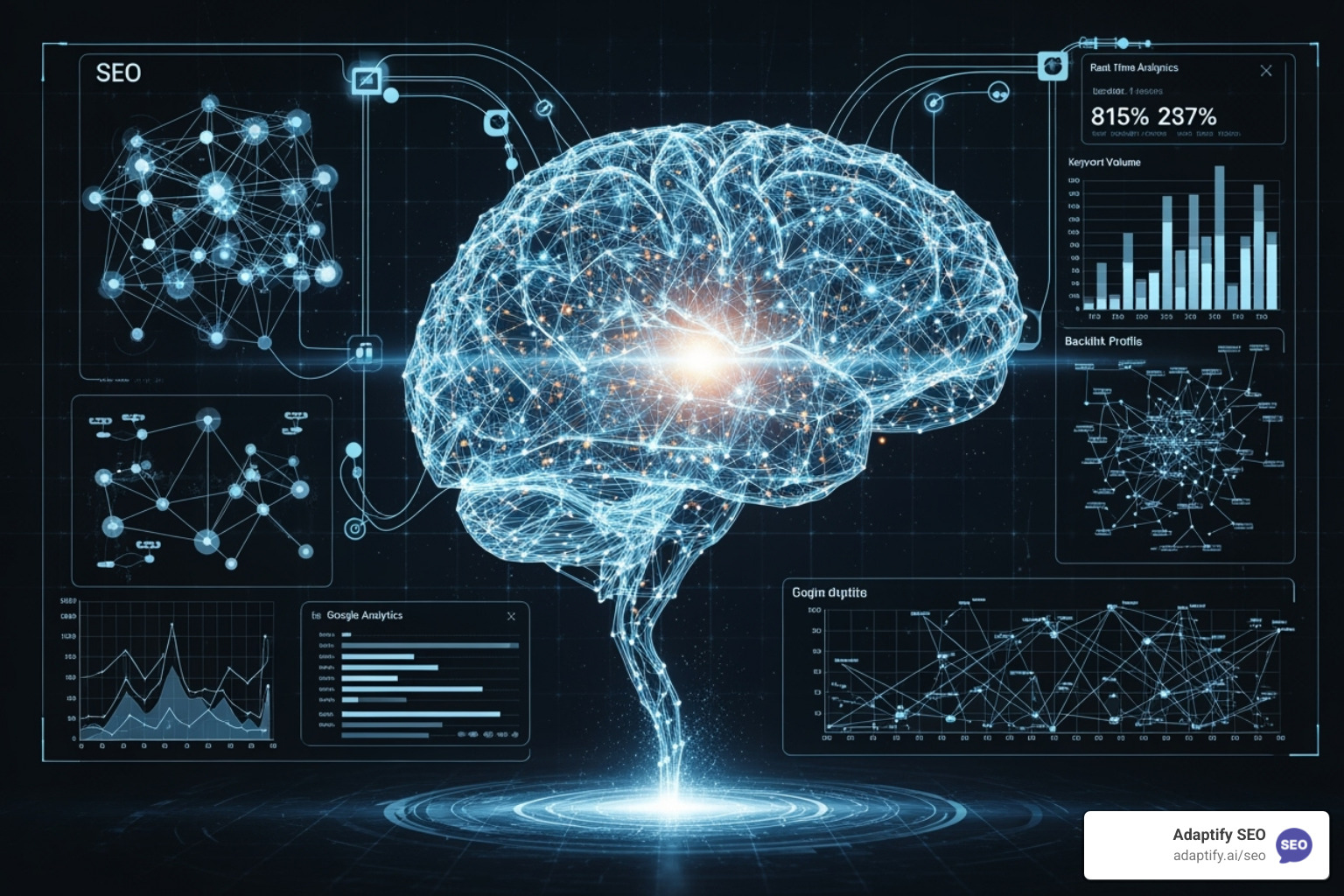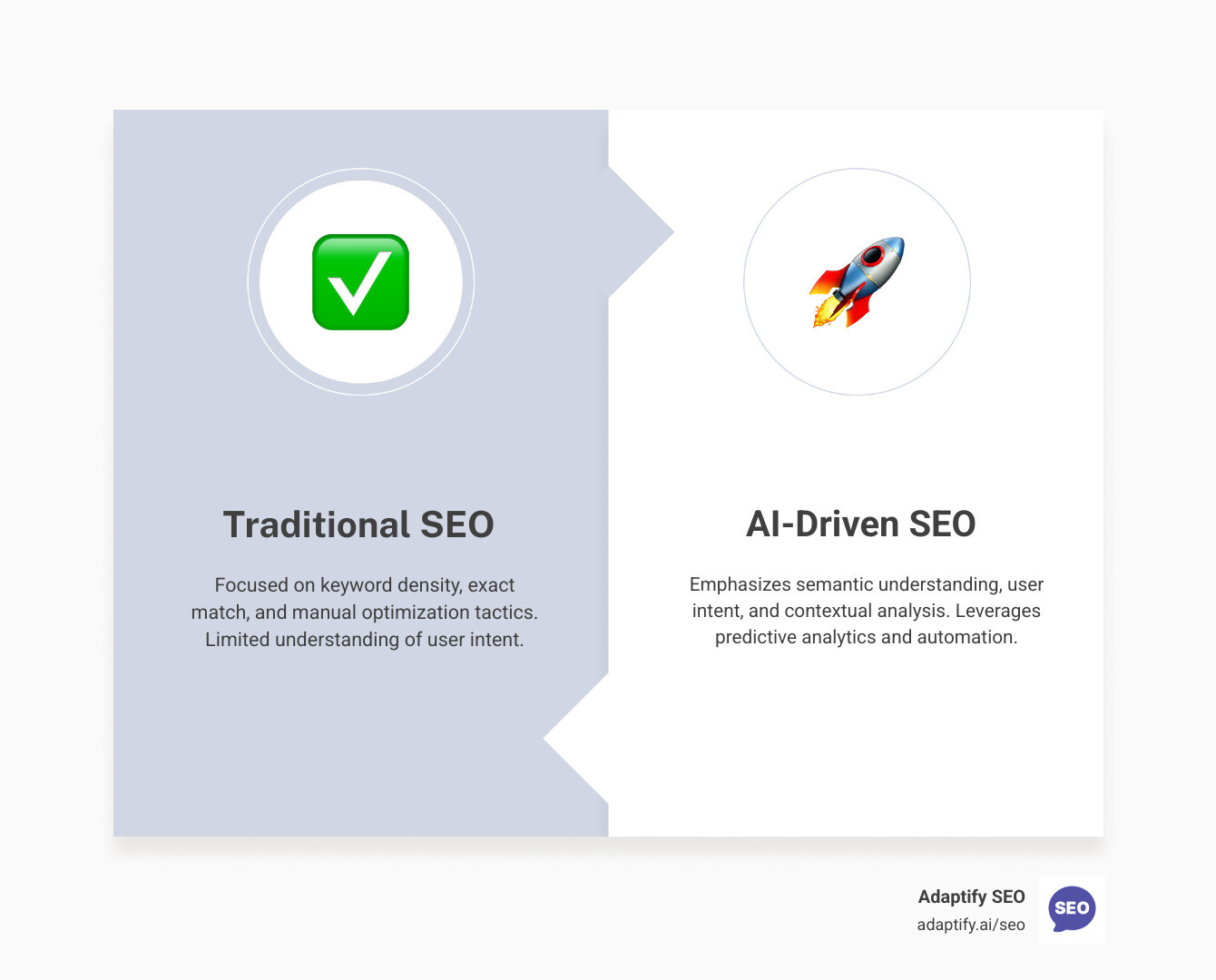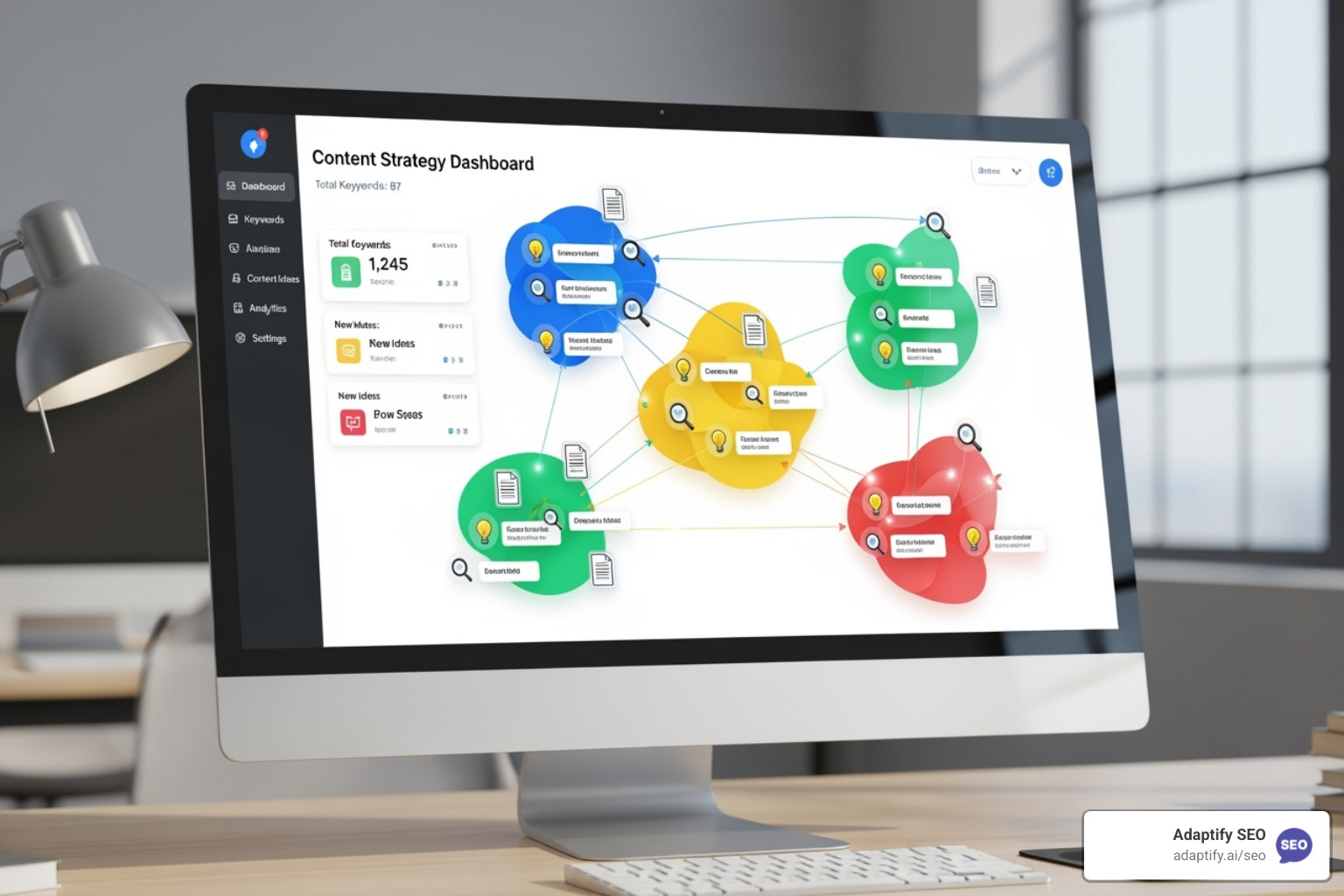Beyond Keywords: The Essential Role of AI in Today's SEO Landscape
Hansjan Kamerling
Nov 28
The Dawn of a New SEO Era: From Manual Tweaks to Intelligent Automation

What role does AI play in modern SEO strategies has become the defining question for digital marketers. The answer is changing everything from keyword research to content creation, shifting the focus from manual tweaks to intelligent automation. AI is no longer a futuristic concept; it's a practical, indispensable component of any competitive digital strategy, acting as a powerful amplifier for human expertise.
AI fundamentally changes SEO by enabling:
- Predictive Analytics to forecast keyword trends. AI algorithms analyze vast datasets of historical search data, social media chatter, and news cycles to identify emerging topics before they hit the mainstream, giving businesses a crucial first-mover advantage.
- Content Automation to generate outlines and drafts at scale. Beyond just writing, AI can automate the creation of meta descriptions, title tags, image alt text, and even repurpose a single blog post into multiple social media updates, saving countless hours.
- Automated Technical SEO to diagnose site issues instantly. Instead of periodic manual audits, AI tools provide continuous monitoring, flagging problems like broken links, crawl errors, or schema issues in real-time, preventing them from impacting performance.
- Smarter Link Building to find high-quality backlink opportunities. AI evaluates potential link prospects on dozens of factors—including semantic relevance, traffic trends, and audience overlap—far beyond traditional domain authority metrics.
- Improved User Experience through personalized content. By analyzing user behavior, AI can dynamically tailor on-page content, product recommendations, and navigation to individual visitor needs, increasing engagement and conversion rates.
- Real-time SERP Analysis to uncover competitor strategies. AI constantly monitors search engine results pages (SERPs), tracking competitor movements, identifying content gaps, and revealing the strategies that are winning in your niche.
The numbers confirm this shift: 86% of SEO professionals have integrated AI into their strategy, and 75% use it to reduce time spent on manual tasks. Most strikingly, AI now automates 44.1% of SEO tasks like content creation and keyword research, freeing up human experts to focus on high-level strategy and creative problem-solving.
As one industry analysis noted: "Artificial intelligence (AI) has permanently changed search. Users are getting custom search results based on their past behaviors, their devices, their locations, and hundreds of other factors."
This isn't just about new tools; it's a new paradigm. Where SEO once relied on keyword matching, AI allows search engines to grasp context, intent, and semantics. I'm Hansjan Kamerling, and having worked with AI startups and SaaS platforms, I've seen how AI transforms SEO from a reactive checklist into a proactive, data-driven growth engine that drives real business success.

How AI Fundamentally Reshapes Search Engines and SEO
To understand what role does AI play in modern SEO strategies, we must first see how AI has transformed search engines themselves. Google no longer just matches keywords; it understands context, intent, and meaning. This fundamental shift means we're no longer optimizing for keywords—we're optimizing for understanding. The entire discipline has moved from a game of linguistic chess to one of deep semantic and psychological insight, powered by machine learning.
The Brains Behind the SERP: Google's AI Algorithms
Several sophisticated AI systems power Google Search. RankBrain, Google's first major AI system introduced in 2015, helps interpret ambiguous or novel search queries—the 15% of searches Google sees every day that have never been seen before. Then came BERT (Bidirectional Encoder Representations from Transformers), which revolutionized natural language understanding by analyzing the relationship between all the words in a sentence, grasping nuances of prepositions and context that were previously missed.
Beyond BERT, Google introduced the Multitask Unified Model (MUM), an even more powerful AI that understands information across different languages and formats, including text, images, and video. MUM is designed to answer complex, multi-step questions that don't have simple answers. For example, a query like, 'I've hiked Mt. Adams and now want to hike Mt. Fuji next fall, what should I do differently to prepare?' requires understanding comparisons, concepts, and gathering insights from multiple sources. For SEOs, this means creating comprehensive, interconnected content that covers a topic from all angles, anticipating follow-up questions and providing holistic value.
As one industry expert explains: "Google's algorithms like RankBrain and BERT have employed AI to not only improve search result accuracy but also assist in understanding user intent."

The Helpful Content Update further evolved this by rewarding content created for humans, not just for search engines. This AI-powered system prioritizes content demonstrating strong E-E-A-T: Experience, Expertise, Authoritativeness, and Trustworthiness. Google's AI can now better distinguish genuinely helpful content that satisfies a user's query from pages merely stuffed with keywords or designed to game the system.
The Rise of Generative Search: SGE and AI Overviews
Google's AI Overviews and Search Generative Experience (SGE) are changing how users interact with search results. Instead of a list of blue links, users often get a comprehensive, AI-generated answer at the top of the page, synthesized from multiple sources. This creates a more conversational and direct search experience.
This rise in "zero-click searches" presents a new challenge and opportunity. The goal is no longer just to rank #1, but to be cited as a trusted source in Google's AI responses. Our research shows that pages that directly address specific queries with well-structured, data-backed information see 31% higher citation rates in AI-generated results. This is particularly critical for informational queries, where SGE is most prominent. For transactional or commercial queries, the impact may be different, but the underlying principle remains: authority and clarity are paramount.
This means your content must provide clear, direct answers to specific questions, structured in a way that Google's AI can easily parse and reference. The emphasis is on semantic search, contextual analysis, and demonstrating E-E-A-T. While traditional keyword tactics are less effective, high-quality, genuinely helpful content has never been more valuable. Google's AI is now better than ever at recognizing and rewarding it.
What Role Does AI Play in Modern SEO Strategies? From Automation to Predictive Analytics
AI has become the ultimate game-changer for SEO professionals, not by replacing human expertise, but by amplifying it. Where we once spent hours on manual research, tedious audits, and data compilation, AI now handles these tasks in minutes, freeing us to focus on high-impact strategy, creativity, and client relationships.
How AI Improves Keyword Research and Content Creation for SEO
AI has transformed keyword research from guesswork into predictive analytics. By processing massive datasets, AI identifies emerging keyword trends before they become mainstream, allowing us to capture demand as it builds. It also enables sophisticated topic clustering, moving beyond single keywords to map out entire content ecosystems. This ensures comprehensive and authoritative coverage that satisfies user intent at every stage of the journey. AI tools can analyze SERPs to reveal the questions people are really asking, providing a direct line into the user's mind.
In content creation, AI acts as a powerful co-pilot. It can generate detailed outlines, draft meta descriptions, create FAQ sections based on 'People Also Ask' data, and suggest semantic optimizations to improve relevance. Tools like SurferSEO, MarketMuse, and Clearscope use AI to analyze top-ranking content and provide data-driven recommendations on terms to include, optimal word count, and content structure. This dramatically accelerates the content lifecycle, allowing teams to focus their energy on adding unique insights, incorporating brand voice, crafting compelling narratives, and ensuring factual accuracy.

Example: Adaptify SEO's AI-driven platform can identify emerging keyword trends and automate the creation of optimized content outlines, saving hours of manual research and writing. This efficiency means our team can focus on refining the narrative and adding that essential human touch of experience and authority.
For more details on how we leverage AI for content, you can check out our dedicated services: More info about our Content services.
Streamlining Technical SEO and Link Building
Manual technical audits are a thing of the past. AI-powered technical site audits can crawl and analyze websites with incredible speed and thoroughness. More importantly, they use anomaly detection to predict potential issues before they impact rankings. For instance, AI can perform log file analysis to understand how search engine bots crawl a site, identifying wasted crawl budget on low-value pages and ensuring critical pages are indexed promptly. It can also build sophisticated internal linking models to distribute PageRank more effectively across the site, boosting the authority of key pages.
For link building, AI revolutionizes backlink analysis by evaluating the quality and relevance of thousands of prospects simultaneously. It can detect toxic links that harm your site's authority and boost link prospecting by identifying relevant websites and suggesting personalized outreach angles based on their content. While relationship-building remains a human endeavor, AI handles the heavy lifting of research and qualification.
Example: Adaptify SEO's automated site audits and link analysis tools help identify technical issues and high-value backlink opportunities faster than traditional manual methods. This means less time chasing down technical glitches and more time building high-authority links that truly move the needle.
Find out how we automate and optimize your backlink strategy: More info about our Backlink services.
Personalizing the User Experience (UX) for Higher Rankings
With user experience now a critical ranking factor, AI provides an unprecedented ability to deliver personalized experiences at scale. Through behavioral analysis, AI processes how users interact with your site and can dynamically adjust content to match their needs. This goes beyond simple chatbots. Think of e-commerce sites where AI dynamically reorders products based on a user's browsing history, or media sites that serve up article recommendations that perfectly match a reader's demonstrated interests. These actions significantly increase engagement metrics like session duration and pages per session, which are powerful positive signals to Google.
This personalization directly impacts key SEO metrics. More engaging experiences lead to higher dwell time, lower bounce rates, and increased conversion rates, signaling to Google that your content is valuable and satisfying user intent. This creates a virtuous cycle: better UX leads to better rankings, which brings more traffic and data, allowing AI to further refine and optimize the experience.

Example: AI-driven personalization, such as dynamic content recommendations and intelligent chatbots, can increase user engagement and improve SEO metrics like dwell time and bounce rate. I've seen how tailoring the experience based on AI insights can significantly boost conversions for our clients, turning passive visitors into active customers.
Google's Rules of Engagement: Using AI Content Ethically and Effectively
A common question is: "Will Google punish my website for using AI content?" The short answer is no, with a crucial caveat. Google doesn't care if content is written by a human or AI; it cares if the content is helpful, reliable, and created for people.
Google's Official Stance on AI-Generated Content
Google's position centers on quality and value, not the creation tool. The guiding principle is creating content that is "helpful for people," aligned with the E-E-A-T framework (Experience, Expertise, Authoritativeness, and Trustworthiness). Low-quality, spammy content is penalized regardless of its origin, while high-quality, valuable content is rewarded, even if AI assisted in its creation. The focus is on the outcome, not the method.
As Google's policy states: "Google's policy states that content must provide added value and not be generated solely to manipulate search engine rankings." The key is using AI as a tool to improve quality, improve research, and scale production of valuable information, not as a shortcut for churning out generic, unhelpful articles.
For Google's full expectations, review their official guidance: Google's official guidelines on content.
Best Practices for AI in SEO: Avoiding Penalties
The difference between successful and penalized AI content is human oversight and value creation. Treat AI as a brilliant but sometimes flawed research assistant, not a final author. To add the 'Experience' component of E-E-A-T, for example, an AI-generated article about a travel destination can be improved with a human's personal anecdotes, original photos, and specific, non-obvious tips that only someone who has actually been there would know. AI provides the factual framework; the human provides the authentic experience that builds trust.
| Low-Quality AI Content (Likely Penalized) | High-Quality, Human-Improved AI Content (Google-Friendly) |
|---|---|
| Generic, repetitive, formulaic | Unique insights, fresh perspectives, strong brand voice |
| Factually incorrect or unverified | Fact-checked, updated, and rigorously accurate |
| Poorly written, awkward phrasing | Edited for clarity, grammar, and natural flow |
| Lacks E-E-A-T signals (no author, no sources) | Demonstrates expertise, authority, and trustworthiness |
| Simply rehashes existing information | Adds new value, original research, or personal experience |
| Relies on outdated or generic data | Incorporates real-time data and current events |
| Generated purely for search rankings | Created to genuinely help and inform users |
To use AI responsibly, always fact-check its output, add your own unique insights, edit for tone and clarity, and ensure the final piece is original and helpful. This human touch is what provides real value and differentiates your content from the sea of mediocrity.
The Enduring Importance of Human Insight in an AI-Dominated SEO Landscape
Human creativity and insight remain irreplaceable. AI can't replicate the strategic thinking needed to align SEO with overarching business goals, nor can it capture the creativity and brand voice that make content memorable and build a loyal audience. As one expert noted, "The human touch, creativity, emotions, and unique perspectives are essential and cannot be replaced by AI in content creation."
Furthermore, human oversight is critical for navigating the ethical complexities of AI. This includes preventing the spread of misinformation, avoiding biases inherent in AI training data, and ensuring that content serves a genuinely positive purpose for the user. SEO is about connecting with people, which requires empathy and cultural understanding—qualities unique to humans. The most successful approach combines AI efficiency with human wisdom. AI handles the data and drafts, while humans provide strategy, creativity, and the crucial understanding of what an audience truly needs.
The Future is Now: How AI is Shaping the Next Wave of SEO
The integration of AI into SEO is not a distant future; it is happening now, reshaping how people search and how businesses must respond. Two major shifts are leading the way: the growth of voice and multimodal search, and the fundamental evolution of the SEO professional's role.
The Impact of Voice and Multimodal Search
Voice search optimization requires a new approach centered on natural language. Instead of short, fragmented keywords, we now optimize for longer, conversational queries like, "Hey Google, what's the best pizza place near me that's open right now and has outdoor seating?" With estimates suggesting that over 50% of households own a smart speaker, optimizing for voice is no longer optional. This means creating content that provides clear, concise, direct answers that smart speakers can read aloud, often by structuring content with FAQ schema and other forms of structured data.
Multimodal search, which combines images, text, and even sound, is also on the rise. This is powered by technologies like Google Lens, where a user can point their camera at a landmark to get information or at a product to find where to buy it. For SEO, this means robust image optimization is paramount, including descriptive filenames, detailed alt text, and implementing product or object schema to give AI the context it needs to 'see' and understand your visual content. AI's image recognition capabilities are the backbone of this evolution, making visual content a new frontier for search visibility.

Example: As voice and visual search become more prevalent, AI-powered SEO strategies must adapt to optimize for natural language queries and image-based searches. At Adaptify SEO, we're already implementing schema markup and optimizing for conversational intent to prepare our clients for this shift, ensuring they are visible wherever and however their customers are searching.
The Evolution of the SEO Professional's Role
AI isn't making SEO professionals obsolete; it's making them more strategic. The role is shifting from manual task execution to high-level strategy and analysis. With AI handling the tedious data collection, content drafting, and technical monitoring, professionals can focus on what humans do best: critical thinking, creative problem-solving, interpreting complex data, and aligning SEO with broader business goals.
The modern SEO professional's toolkit now includes skills like prompt engineering to coax the best output from AI models, data science literacy to interpret complex analytics, and cross-functional communication to translate SEO insights into strategic recommendations for marketing, sales, and product teams. This evolution lifts SEO professionals from technicians to strategic business partners. AI-driven insights now inform product development, market expansion, and competitive positioning. We see SEOs translating AI data into actionable business intelligence, driving growth across entire organizations.
Example: With AI handling repetitive tasks, SEO professionals at Adaptify SEO focus on strategic planning, data interpretation, and cross-functional collaboration to drive business growth. This allows us to serve clients more effectively, whether they're local agencies or global enterprises.
For agencies looking to scale their offerings while focusing on high-level strategy, this evolution opens incredible opportunities: More info about our White-Label SEO services for agencies.
Frequently Asked Questions about AI's Role in SEO
Here are answers to the most common questions about AI's role in SEO.
Will AI replace SEO professionals?
No. AI won't replace SEO professionals; it will augment and improve them. AI is a tool that automates repetitive, data-heavy tasks like keyword research, rank tracking, and technical audits. However, it cannot replicate human strategy, creativity, ethical judgment, or empathy. It can't understand a client's unique business goals, steer complex brand politics, or build the relationships necessary for high-quality link building. The role of the SEO professional is evolving to focus more on high-level strategy, data interpretation, and creative direction, using AI as a powerful assistant to execute more efficiently.
Does Google penalize all AI-generated content?
No. Google penalizes low-quality content, regardless of its origin. Their focus is on helpful, accurate, and trustworthy content that adheres to E-E-A-T (Experience, Expertise, Authoritativeness, Trustworthiness) principles. AI-assisted content that has been heavily edited, fact-checked, and improved by a human expert to provide genuine value is perfectly acceptable and can rank very well. The key is to use AI as a starting point or a research tool, not a final publisher. Content created solely to manipulate rankings, without human oversight or added value, is what Google targets. You can find more in Google's Webmaster Guidelines.
What are the biggest limitations of AI in SEO?
While powerful, AI has significant limitations. It lacks true creativity and the ability to generate genuinely novel ideas or strategic angles. AI models can also 'hallucinate' or present false information with confidence, making human fact-checking and expert verification absolutely essential. They struggle with understanding a specific brand voice, a nuanced tone, and the subtle emotional triggers that connect with a human audience. Finally, AI operates on existing data, so it cannot predict truly disruptive market shifts or invent a new strategic direction from scratch. It is an optimization engine, not a visionary.
What are some popular AI-powered SEO tools?
The market is filled with excellent specialized tools like Semrush for all-around analytics, Ahrefs for backlink analysis, and Jasper for content generation. However, managing multiple specialized tools can become complex, inefficient, and costly for agencies and businesses. That's why we built Adaptify SEO as a comprehensive, fully automated solution. Our platform integrates predictive keyword research, continuous site audits, AI-assisted content creation, and intelligent link building into a single, streamlined workflow. It's designed for agencies and businesses that want the full power of AI without the complexity of juggling multiple subscriptions, simplifying the entire SEO process from strategy to execution.
Our Locations and Global Reach
AI-powered SEO transcends geographical boundaries, but sustainable success still requires honoring local nuances. At Adaptify SEO, we have built our global presence on this core philosophy: combining centralized AI power with decentralized human expertise.
With our headquarters in the tech hub of Amsterdam and key offices in London, Sydney, and Singapore, we serve clients across the globe. Each office is a center of excellence, staffed by experts who understand the unique search behaviors, cultural contexts, and business landscapes of its region.
- Our headquarters in Amsterdam places us at the heart of European innovation, tackling complex multilingual SEO challenges for clients expanding across the continent.
- Our London office steers the highly competitive UK market, where AI-driven competitive analysis is key to gaining an edge in saturated industries like finance and e-commerce.
- In Sydney, our team pioneers strategies for a mobile-first audience, focusing on voice search optimization and local SEO for a geographically dispersed population.
- Our Singapore hub serves as a gateway to the diverse Asia-Pacific market, leveraging AI to manage campaigns across multiple languages and cultural contexts, from the nuances of Singlish to the booming digital economies of Southeast Asia.
This global footprint continuously improves our AI models with diverse, international data. Our London team provides insights into European financial trends, our Sydney office pioneers new approaches to voice search optimization, and our Singapore hub tackles complex multilingual SEO challenges. This structure allows us to combine the scalable power of our automated platform with the irreplaceable value of local human expertise, delivering strategies that are both globally consistent and locally potent.
Conclusion: Embracing AI to Build a Smarter SEO Future
So, what role does AI play in modern SEO strategies? It's clear that AI is not just another tool; it is the new foundation of the industry, rewriting the playbook from the ground up. It has moved us from an era of manual guesswork and reactive fixes to a world of predictive analytics, automated content creation, and proactive technical optimization. AI is the engine that powers a deeper understanding of both search engine algorithms and human user intent.
This evolution enables the creation of truly user-centric experiences that Google's sophisticated AI, from BERT to MUM, is designed to recognize and reward. We've seen how AI reshapes every facet of SEO—from identifying keyword trends before they peak, to auditing a site's technical health in real-time, to personalizing the user journey on the fly. We've also established the critical importance of ethical application, using AI as a co-pilot guided by human strategy and E-E-A-T principles, not as an autopilot.
Businesses that thrive in this new era are those that accept AI strategically, automating tedious work to free up their human experts for what they do best: creative strategy, brand storytelling, and building genuine connections with their audience. At Adaptify SEO, we see clients achieve breakthrough results by integrating this philosophy into their workflows. They scale high-quality content, identify hidden competitive opportunities, and build sustainable organic growth that drives their bottom line.
The reality is that AI is essential for modern SEO success. The question is no longer if you should adopt it, but how quickly and how strategically you can integrate it to stay ahead of the competition. The future of SEO is here, and it's powered by intelligent automation and human insight working in perfect harmony.
Ready to see how AI automation can transform your SEO workflow?

